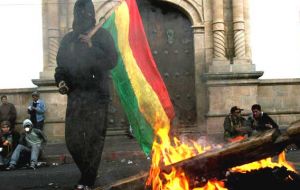MercoPress. South Atlantic News Agency
Bolivia's Morales and opposition ready for more violence
 Unending violence and riots challenge Bolivia's unity
Unending violence and riots challenge Bolivia's unity Bolivian President Evo Morales lashed out at opponents on Monday after five people were killed and hundreds injured in violent protests against his reforms and opposition leaders renewed threats to secede from the central government.
Violence exploded on the streets of the southern city of Sucre over the weekend after Morales' leftist allies pushed a draft of a new constitution through a constitutional assembly under military guard. The United Nations and the US State Department expressed concern over the violence and urged both sides to show restraint and tolerance. "In order to strengthen democracy and respect for human rights in Bolivia, the secretary general urges all political and social actors to remain calm, to abstain from using violence and to seek a consensus on the pressing issues affecting the Bolivian people" Ban Ki moon press office said in a statement. In Washington, State Department spokesman Sean McCormack said the US government deplored the violence and urged the Morales administration and the opposition "to show restraint and tolerance during this critical period". President Morales has made rewriting the constitution a pillar of his reform agenda, but the issue has deepened ethnic and regional divisions in Bolivia, which has a long history of political upheaval. Morales took office as Bolivia's first indigenous president in January 2006 vowing to increase state control over the economy and empower the poor Indian majority. He has since nationalized the natural gas industry, the country's main foreign currency income and seeks to give more autonomy to indigenous groups. But in the opposition stronghold of Santa Cruz, the country's economic powerhouse in the east, residents rallied in the main square on Monday and voted in a public forum to authorize a civic committee to declare autonomy. Flanked by the Santa Cruz mayor and the regional governor, Branco Marinkovic, a leader of the Santa Cruz secessionist movement, said the afternoon rally gave him "a mandate" to begin the autonomy process The president spoke heatedly against anti-government protesters in Santa Cruz who occupied state offices and said his government was trying to work for change for everybody. "Occupying state offices isn't democracy, civil disobedience isn't democracy, and we hope the Bolivian people ... identify these traitors, the people who are against the nation and want to damage this process of change," Morales said before thousands of followers in La Paz. Five people were killed in the weekend's unrest in Sucre, in which demonstrators torched police stations and stormed a jail, freeing 100 inmates. One of the dead was a policeman lynched by protesters and the other victims were civilians. A funeral for two of the dead turned into an anti-government protest in Sucre, 700 kilometers south of La Paz, as the government contemplated emergency measures to bring the city of 350,000 people back under control. Morales' agenda has angered opponents, who say he is only ruling for his Indian power base, and protests have raged for days against the assembly writing the new constitution. Morales is an Aymara Indian who comess from the poorer Andean west, while his conservative rivals, mostly white stock, are concentrated in the richer east and especially in the city of Santa Cruz Bolivia is South America's top natural gas exporter but it is also one of the region's most unstable countries and violent uprisings toppled governments in 2003 and 2005.




Top Comments
Disclaimer & comment rulesCommenting for this story is now closed.
If you have a Facebook account, become a fan and comment on our Facebook Page!